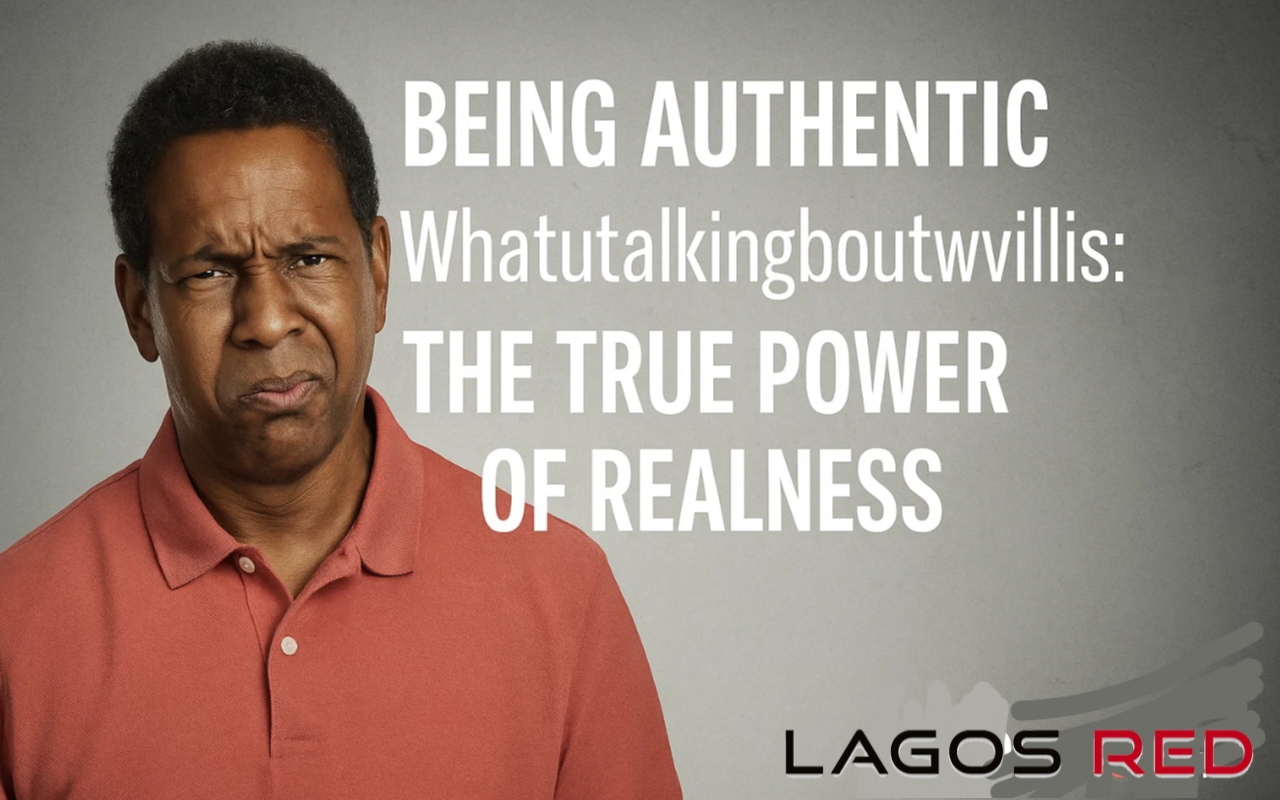Introduction
In today’s hyper-connected world, where likes, followers, and filters dominate social media, the idea of being authentic feels almost rebellious. The phrase “being authentic whatutalkingboutwillis” might sound playful, but beneath its humor lies a serious question — are we truly living as ourselves, or just performing versions of who we think we should be? Authenticity isn’t about perfection or popularity; it’s about showing up as the raw, unedited version of you.
The truth is, we all crave authenticity — in ourselves, in relationships, and even in the brands we follow. Yet, it’s also one of the hardest traits to practice consistently. Why? Because being authentic means risking judgment, rejection, or misunderstanding. It means daring to be seen without the safety net of pretension. But if you can master this, it becomes your greatest strength, your personal superpower.
When I first encountered the phrase “What you talkin’ ’bout, Willis?” from the 80s sitcom Diff’rent Strokes, I laughed like anyone else. But today, it feels like a mirror — a challenge to pause and ask myself: “What am I really saying? Who am I really being?” And that’s where the journey begins — in self-reflection and courage to be real.
What Does It Mean to Be Authentic?
Authenticity means that who you are on the inside matches what people see on the outside. It’s not about spilling every secret or being brutally honest at all times — it’s about living in harmony with your core values. An authentic person acts in alignment with what they believe, not with what others expect of them.
Think of authenticity like a compass. You may wander off track sometimes, but as long as your internal compass points toward truth, you’ll find your way back. Authenticity isn’t about being loud or dramatic; it’s about being consistent. It’s saying what you mean and meaning what you say. Even when it’s uncomfortable.
Many of us wear masks — polite smiles in workplaces, exaggerated confidence on social media, or quiet compliance in relationships. But these masks cost us emotional energy. Living authentically removes the mask and lets your real identity breathe. You’ll notice a sense of peace when your words, actions, and values finally align.
Why Authenticity Feels So Difficult
If authenticity is natural, why do we struggle with it so much? The short answer: fear. Fear of judgment, fear of rejection, fear of not being “enough.” From childhood, most of us are trained to fit in — to behave, perform, and achieve according to social standards. It’s no wonder that as adults, we often forget how to simply be ourselves.
One reason authenticity feels tough is because of our environment. Social media tells us we must be interesting, successful, and happy all the time. When the world rewards perfection, showing imperfection feels risky. But here’s the truth — being authentic doesn’t mean being flawless. It means being real in a world addicted to fake.
Another challenge is internal — our own insecurities. We compare our behind-the-scenes with someone else’s highlight reel. We fear that if people see our flaws, they’ll walk away. But in reality, authenticity attracts the right people. When you are genuine, you invite relationships and opportunities that fit your real self.
The Benefits of Living Authentically
When you decide to live authentically, something amazing happens: you begin to feel lighter. You stop pretending, stop performing, and start living. This shift brings incredible mental and emotional benefits.
-
Improved Mental Health: Pretending is exhausting. When you embrace authenticity, anxiety and stress often decrease because you’re no longer hiding behind masks.
-
Stronger Relationships: Authentic people attract deeper, more meaningful connections. Real recognizes real — and when you’re genuine, you draw people who value honesty.
-
Increased Self-Confidence: Being true to yourself strengthens your self-trust. You stop seeking validation and start standing firm in who you are.
Over time, authenticity also improves professional success. People trust authentic leaders, follow transparent brands, and respect colleagues who are open about both their strengths and struggles. Being authentic isn’t just emotionally rewarding — it’s also strategically smart.
How to Practice Authenticity in Everyday Life
Being authentic isn’t an overnight transformation — it’s a practice. Like any skill, it strengthens with awareness and repetition. Here’s how to begin:
First, take time for self-reflection. Ask yourself what truly matters to you. What values guide your life? What kind of person do you want to be remembered as? Once you have these answers, it becomes easier to act in ways that reflect them.
Second, speak your truth — even when your voice shakes. That doesn’t mean being rude or confrontational. It means communicating honestly, with kindness and courage. Sometimes saying “no” is the most authentic thing you can do.
Third, allow vulnerability. Realness often looks like imperfection — the messy, unfiltered kind. Don’t hide it. People relate to you more when they see your humanity, not your highlight reel. Each time you choose vulnerability over image, you build authenticity.
Authenticity in Relationships: The Key to Real Connection
Relationships thrive on truth. When you pretend to be someone else, you may gain approval, but you lose intimacy. Being authentic in relationships means being honest about what you need, how you feel, and what you believe — even if it risks disagreement.
In my own experience, I learned this the hard way. For years, I avoided conflict by agreeing with everything. I thought that being agreeable meant being kind. It didn’t. It meant I was slowly disappearing. When I began saying what I actually felt — gently, but clearly — my relationships changed. Some faded, but others deepened. That’s the trade-off authenticity demands.
Real love and friendship require truth. You cannot be loved for who you are if no one actually sees who you are. By being authentic, you give others the permission to do the same. That’s how connection grows — not through perfection, but through shared truth.
Authenticity in Work and Professional Life
In professional settings, authenticity often takes courage. Many people hide their opinions or personalities at work for fear of judgment or losing opportunities. But the most respected leaders and entrepreneurs today have one thing in common: they are unapologetically themselves.
When you act authentically in your career, you align your work with your values. You don’t just chase money — you pursue meaning. For example, if transparency is your value, lead your team with honesty. If creativity drives you, bring original ideas even if they seem unconventional. Your authenticity becomes your brand.
However, authenticity doesn’t mean oversharing. It means consistent integrity. Be honest about what you know, what you don’t, and what you’re learning. Colleagues trust people who are transparent about their process, not those who pretend to have all the answers. In short — be human, not robotic. That’s what people respect most.
The Role of Social Media in Authenticity
Let’s be honest — the digital world complicates authenticity. Platforms like Instagram, TikTok, or X reward attention more than honesty. The temptation to curate a perfect life is strong. But even online, authenticity can stand out like sunlight through fog.
To stay real online, share experiences, not just achievements. Talk about your failures and lessons, not just highlights. People relate to stories that feel genuine. One post of truth can inspire more connection than fifty filtered photos.
You can also set digital boundaries. Ask yourself before posting: “Is this true to me? Am I sharing for expression or validation?” When your intent is expression, it’s authentic. When it’s validation, it’s performance. The difference determines how people perceive your energy. Remember: authenticity online isn’t about full transparency — it’s about honest representation.
The Journey of Self-Acceptance
Authenticity and self-acceptance go hand in hand. You can’t live authentically if you secretly despise parts of yourself. The journey starts with radical acceptance — acknowledging your strengths, flaws, and contradictions.
Self-acceptance isn’t the same as complacency. It doesn’t mean you stop growing. It means you stop hating yourself for being a work in progress. Once you accept your imperfections, they lose power over you. Authentic people don’t pretend to be perfect — they accept their wholeness.
I used to believe I had to fix everything about myself before being worthy of respect. Over time, I realized that authenticity isn’t about becoming flawless; it’s about being fearless in your truth. When you make peace with your story, you inspire others to do the same.
Practical Steps to Strengthen Authentic Living
Let’s make authenticity actionable. Here are five real-world steps you can start today:
-
Check in with yourself daily. Ask, “Am I acting in alignment with my values?”
-
Speak up once a day — in one conversation, share a truth you’d normally hide.
-
Set one boundary per week. Say no when something doesn’t feel right.
-
Reduce comparison. Celebrate others without devaluing yourself.
-
Reflect weekly. Journal moments where you felt most authentic or fake — and why.
Each small act builds self-trust. Over time, authenticity becomes your natural rhythm. It’s like a muscle: the more you use it, the stronger it grows.
Conclusion: The Real You Is Enough
At the end of this journey, authenticity isn’t about becoming someone new — it’s about remembering who you’ve always been. The phrase “being authentic whatutalkingboutwillis” is both a question and a challenge. It’s the world asking: “Are you speaking your truth, or just echoing others?”
Being authentic means embracing your story — the struggles, the quirks, the laughter, the scars — everything that makes you human. It’s messy but magnetic. The world doesn’t need more perfect people; it needs more real ones.
So today, choose real over right. Choose honest over popular. Choose truth over trend. Because when you live authentically, you don’t just free yourself — you give others permission to do the same.



